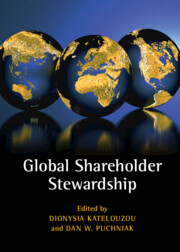Book contents
- Endorsements
- Global Shareholder Stewardship
- Global Shareholder Stewardship
- Copyright page
- Dedication
- Contents
- Figures
- Tables
- Contributors
- Foreword
- Acknowledgements
- Abbreviations
- Part I Foundations
- Part II Jurisdictions
- 4 Shareholder Stewardship in the Netherlands
- 5 Capitalist Stakeholders
- 6 Institutional Investor Stewardship in Italian Corporate Governance
- 7 The Danish Stewardship Code
- 8 Stewardship Norwegian-Style
- 9 Stewardship and Shareholder Engagement in Germany
- 10 The Japanese Stewardship Code
- 11 Korea’s Stewardship Code and the Rise of Shareholder Activism
- 12 The Assessment of Taiwan’s Shareholder Stewardship Codes
- 13 Stewardship in the Hong Kong International Financial Centre
- 14 Singapore’s Embrace of Shareholder Stewardship
- 15 Institutional Investor Stewardship in Malaysia
- 16 The Thai Institutional Investors Stewardship Code and Its Implementation
- 17 Shareholder Stewardship in India
- 18 Institutional Investors in China
- 19 Stewardship and Collective Action
- 20 Stewardship Principles in Canada
- 21 The Uncertain Stewardship Potential of Index Funds
- 22 Encouraging Sustainable Investment in South Africa
- 23 Stewardship in Kenya
- 24 The Brazilian Stewardship Framework
- Part III Comparisons
- Index
21 - The Uncertain Stewardship Potential of Index Funds
from Part II - Jurisdictions
Published online by Cambridge University Press: 28 April 2022
- Endorsements
- Global Shareholder Stewardship
- Global Shareholder Stewardship
- Copyright page
- Dedication
- Contents
- Figures
- Tables
- Contributors
- Foreword
- Acknowledgements
- Abbreviations
- Part I Foundations
- Part II Jurisdictions
- 4 Shareholder Stewardship in the Netherlands
- 5 Capitalist Stakeholders
- 6 Institutional Investor Stewardship in Italian Corporate Governance
- 7 The Danish Stewardship Code
- 8 Stewardship Norwegian-Style
- 9 Stewardship and Shareholder Engagement in Germany
- 10 The Japanese Stewardship Code
- 11 Korea’s Stewardship Code and the Rise of Shareholder Activism
- 12 The Assessment of Taiwan’s Shareholder Stewardship Codes
- 13 Stewardship in the Hong Kong International Financial Centre
- 14 Singapore’s Embrace of Shareholder Stewardship
- 15 Institutional Investor Stewardship in Malaysia
- 16 The Thai Institutional Investors Stewardship Code and Its Implementation
- 17 Shareholder Stewardship in India
- 18 Institutional Investors in China
- 19 Stewardship and Collective Action
- 20 Stewardship Principles in Canada
- 21 The Uncertain Stewardship Potential of Index Funds
- 22 Encouraging Sustainable Investment in South Africa
- 23 Stewardship in Kenya
- 24 The Brazilian Stewardship Framework
- Part III Comparisons
- Index
Summary
Regulators and commentators around the world are increasingly demanding that institutional investors engage in stewardship with respect to their portfolio companies. Further, the demand for stewardship has broadened from an expectation that investors engage to reduce agency costs and promote economic value to a call for investors to demand that companies serve a broader range of societal interests and objectives. This chapter considers calls for stewardship in the context of the U.S. capital markets specifically as applied to index funds. It argues that, irrespective of the merits of institutional stewardship generally, the structure of index funds and the business environment in which they operate limit their ability to engage in effective stewardship. Although index fund sponsors have had a powerful influence on their portfolio companies, well-intentioned calls for them to play a more significant role and, in particular, claims that they should incorporate non-economic objectives more broadly into their engagement strategy, are in tension with the valuable role that index funds serve in the U.S. markets by providing a low-cost diversified investment option for an increasing segment of ordinary citizens. The chapter concludes by considering the possibility of using pass-through voting to enhance the stewardship potential of index funds.
Keywords
- Type
- Chapter
- Information
- Global Shareholder Stewardship , pp. 454 - 470Publisher: Cambridge University PressPrint publication year: 2022
- 3
- Cited by

